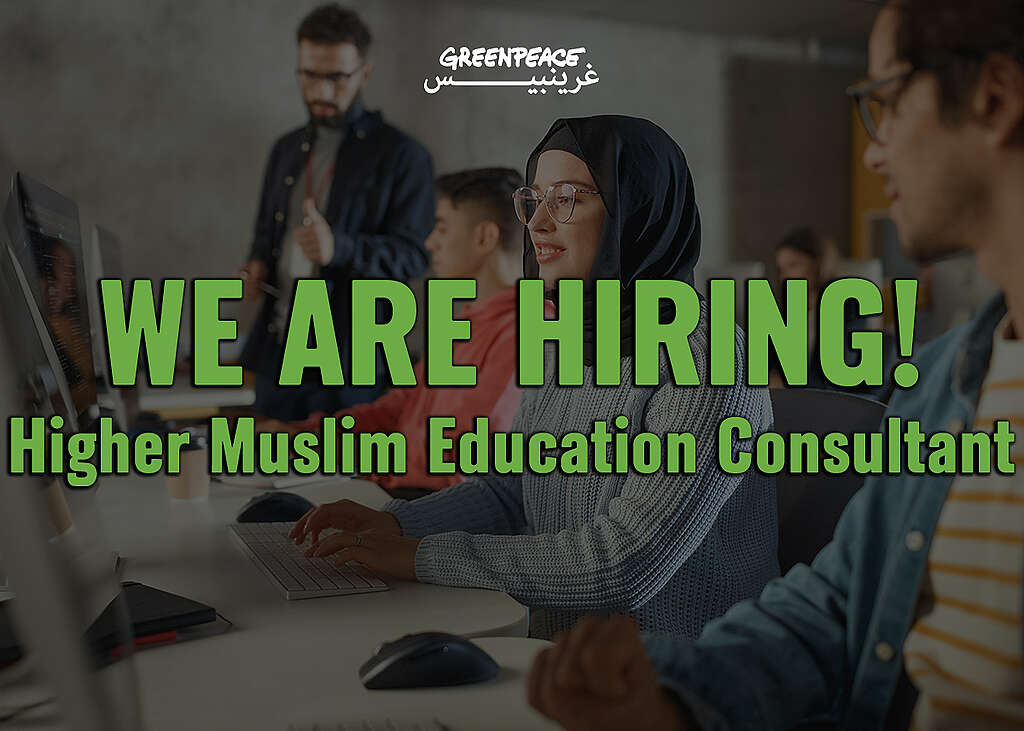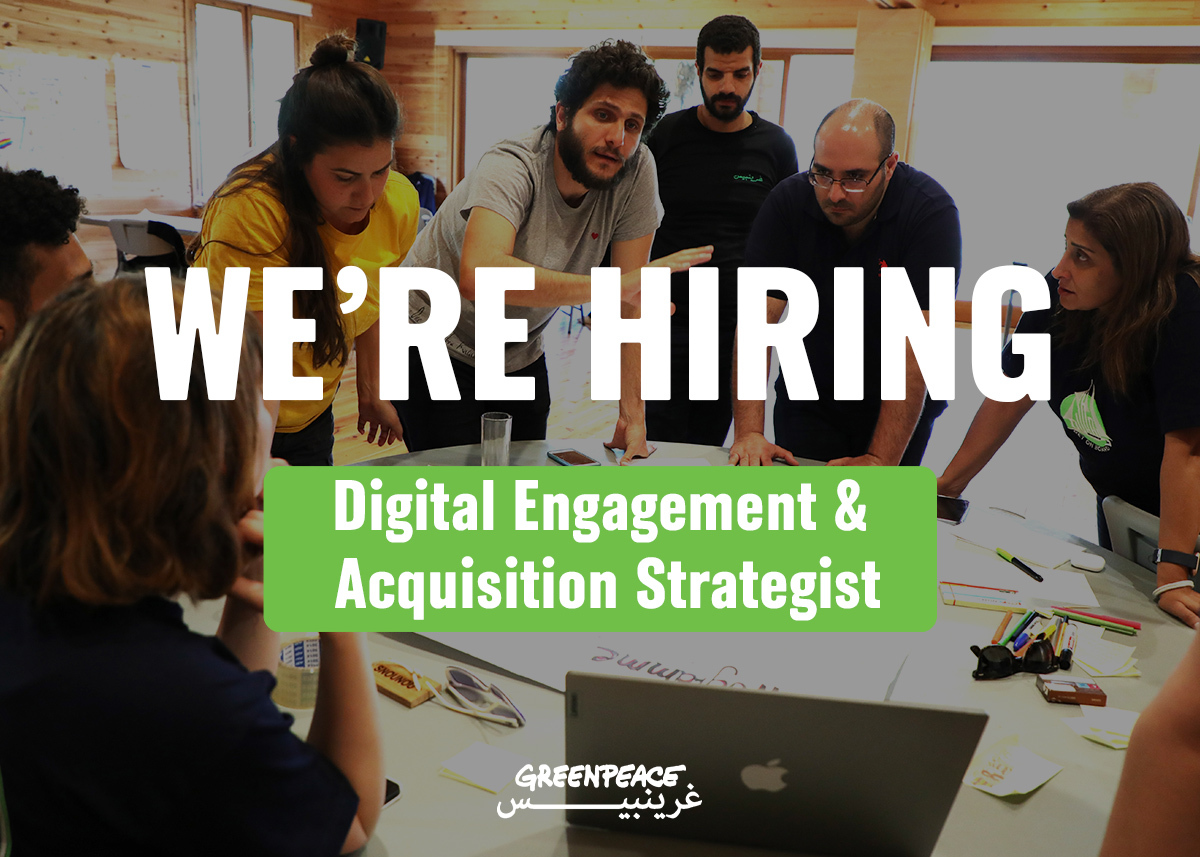
Job Title: Higher Muslim Education Consultant (Ummah for Earth Project)
Organization: Greenpeace MENA
Employment Type: Service Agreement (4 months subject to extension)
Department: Ummah For Earth Project at Greenpeace MENA
Reports to: Project Campaigner & Global Outreach Coordinator
Location: The job is based in the MENA region (Remotely)
______________________________________________________________________
Description
Ummah for Earth (U4E) is a faith-based climate alliance that was created in 2020 to protect the most vulnerable people from the adverse effects of climate change. We have been focusing on empowering communities and local environmental initiatives, shedding light on the intersection between Islamic faith and climate action, and encouraging and helping Muslims and youth to raise their voices for the well-being of our common home.
The Ummah for Earth alliance was officially launched on 19 October 2020.
Objectives
- To seamlessly integrate climate change education into the MENA region and Indonesian Muslim Imams’ higher education institutions. This integration encompasses curricular development, faculty training, and a comprehensive understanding of climate change’s multidimensional aspects.
- To insert climate change topics into existing relevant courses, fostering an immediate increase in environmental awareness and knowledge among students and educators of Sharia Faculties.
- To establish a sustainable framework for climate change education within the MENA region and Indonesian Muslim Imams’ higher education institutions. This includes policy advocacy, engagement with university leadership, and the creation of a dedicated Center for Climate Change Education.
- To establish a HIE network and build strategic partnerships with universities, religious leaders, and policymakers
RESPONSIBILITIES
The overall purpose of the consultant is to act as a Global Higher Islamic Education Adviser, facilitate relationship building, lead educational material development, coordinate across events, and represent the campaign publicly to ensure maximum impact within the Higher Islamic Education sector.
Strategic Planning and COORDINATION: Develop a comprehensive Islamic education plan with clear KPIs and implementation frameworks that address contemporary workforce needs. Proactively build and manage relationships with Universities in the MENA region and globally, coordinating with Greenpeace MENA teams, U4E alliance members, and external campaign stakeholders. Create cross-institutional collaboration networks that enable effective knowledge sharing and resource optimization across different time zones and cultural contexts.
REPRESENTING THE CAMPAIGN Represent Greenpeace ΜΕΝΑ and Ummah for Earth as a spokesperson at eg, relevant international and national Higher Islamic Education meetings, conventions, forums, conferences, and press conferences when needed.
FUNDRAISING: Proactively build/manage relationships with Philanthropists and Foundations to get maximum buy-in for Higher Islamic Education. Support the GP MENA fundraising department with identifying plans and tactics that could be good to pitch.
Stakeholder Engagement: Facilitate partnerships with universities, Imams, and policymakers.
Curriculum Integration: Advise on embedding climate topics into Islamic higher education curricula through evidence-based integration approaches, such as but not limited to:
- Cross-Disciplinary Embedding: Advise on curriculum, programs, and capacity building within Sharia, Islamic Studies, and Education faculties
- Culturally Responsive Content Development: Create educational materials that authentically integrate Islamic teachings (Stewardship, Balance, Wisdom) with practical climate competencies, ensuring local environmental relevance
- Progressive Learning Pathways: Support curriculum that builds from foundational climate literacy to advanced environmental stewardship capabilities
- Assessment & Evaluation Tools: Develop measurement systems for both Islamic scholarship outcomes and climate competency development
- Digital Learning Integration: Incorporate online and hybrid learning methodologies to enhance accessibility and reach
Capacity Building: Design and implement comprehensive training programs addressing identified educational barriers:
Intensive Faculty Development: Deliver expert training modules for academics, incorporating adult learning best practices
Institutional Support Systems: Develop platforms for engagement and collaboration within the center across different fields with incentives for participating in collaborative programs
Digital Pedagogical Skills: Build faculty capabilities for effective climate education delivery across various platforms and learning environments
Monitoring & Evaluation (M&E): Develop tools to measure impact (e.g., knowledge gain, policy adoption).
QUALIFICATIONS, SKILLS, AND EXPERIENCE
Education and Experience required
- Advanced degree (Master’s or PhD) in Islamic Studies, Sharia, Education, Environmental Sciences, Sustainable Development, or a related field.
- Specialization in Islamic environmental ethics, climate change, or faith-based sustainability is a strong plus.
- Minimum 5-7 years of experience in higher Islamic education curriculum development, Islamic scholarship, or religious leadership engagement.
- Experience in NGOs, international organizations, or advocacy campaigns (especially in the MENA region or Indonesia).
Key Skills & Competencies:
1. Technical & Subject-Matter Expertise:
- Strong understanding of climate change science, policy, and solutions relevant to Muslim-majority countries.
- Experience in developing educational materials, training modules, and curricula for Islamic institutions.
2. Stakeholder Engagement & Representation:
- Ability to engage with high-level religious leaders (Imams, scholars), university deans, and policymakers.
- Strong public speaking and diplomacy skills
- Experience in fundraising, donor relations, or partnership-building with philanthropists and foundations.
3. Strategic & Coordination Skills:
- Ability to design and implement long-term education strategies with measurable KPIs.
- Experience in building networks and coalitions (e.g., university alliances, interfaith climate groups).
4. Monitoring & Evaluation (M&E):
- Experience in developing assessment tools to measure educational impact (e.g., surveys, policy adoption tracking).
5. Language & Cultural Competency:
- Fluent in Arabic and English (required).
- Knowledge of Indonesian, French, or other regional languages is a plus.
- Deep understanding of cultural and religious sensitivities in the MENA region and Indonesia.
6. Digital & Remote Work Proficiency:
- Comfortable with online collaboration tools (Zoom, Slack, Google Workspace).
- Experience in digital learning platforms (e.g., MOOCs, webinars for Islamic education).
Desirable Additional Experience:
- Previous work with Islamic universities (e.g., Al-Azhar, IIUM, UIN Jakarta) or international bodies (ISESCO, OIC).
- Publications or research on Islam and ecology, climate change, or sustainability.
- Experience in grant writing or proposal development for environmental/education projects.
Technical & Analytical Skills:
- Strong expertise in qualitative and quantitative research methods, including surveys, focus groups, key informant interviews, and participatory evaluation techniques.
- Experience in developing evaluation frameworks, theories of change, and logical models for advocacy or movement-building programs.
- Ability to analyze complex data, synthesize findings, and provide actionable recommendations for program improvement.
Commitment
Commitment to Greenpeace’s core values in response to environmental and peace issues through non-violent direct action-led campaigning in line with its mission
Disclaimer
Greenpeace MENA is committed to achieving diversity within its workforce and encourages applicants irrespective of gender, nationality, disability, sexual orientation, culture, religion, and ethnic background to apply. All applications will be treated with the strictest confidence.
How to apply
Please send your CV and Cover Letter to this link no later than August 1, 2025.



